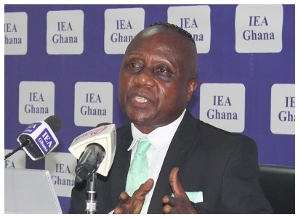 Senior Economist and Director of Research at the IEA, Dr John Kwakye
Senior Economist and Director of Research at the IEA, Dr John Kwakye
In resetting the economy, the Institute of Economic Affairs (IEA) is calling for the creation of a separate Ministry of Economy alongside the existing Ministry of Finance.
This new Ministry of Economy would absorb the National Development Planning Commission (NDPC) and be charged with preparing National Development plans, so that the Ministry of Finance can focus on managing government finances in line with development strategy prepared by the Ministry of Economy.
This recommendation forms part of a comprehensive reform policy brief unveiled by the think-tank ahead of the December 2024 elections.
Indeed, the IEA noted that Ghana has been facing multiple economic challenges…resulting from a combination of external shocks and domestic policy shortcomings.
Economic growth moderated to 3.1 percent in 2022 from 5.1 percent in 2021, with a further slowdown to 2.9 percent in 2023. Inflation skyrocketed to a near-record 54.1 percent for 2022 before easing to 23.2 percent in 2023.
Meanwhile, the public debt-to-GDP ratio, while improving, remained alarmingly high at 82.9 percent as of 2023.
The IEA cautions that without transformation the country cannot make much progress, and will continue to grapple with many economic problems while lagging behind the rest of the world.
Additionally, the IEA proposes renegotiating existing mineral contracts and establishing a state-owned company for minerals, akin to the Ghana National Petroleum Corporation (GNPC) in the oil sector.
“Future mineral agreements should be based on ‘product-sharing’ or ‘service contracts”. This is to maximise Ghana’s ownership and benefits from its resources. Lastly, the IEA advocates for stringent fiscal discipline. It suggests reducing the current Fiscal Rule of five percent deficit-to-Gross Domestic Product (GDP) ceiling to a tighter three, in line with ECOWAS criteria.
Also, it proposes introducing a debt/GDP ceiling of 60 percent – deemed the sustainable level for Ghana by international standards.
In addressing governance issues, the public policy think-tank recommended separating the roles of Attorney-General and Minister of Justice to bolster the fight against corruption.
Analysts broadly agree that the incoming government will face a daunting task in implementing wide-ranging reforms while navigating the complex global economic landscape. All said and done, there is a need to chart a new path since repeating the same policies will not achieve different outcomes.